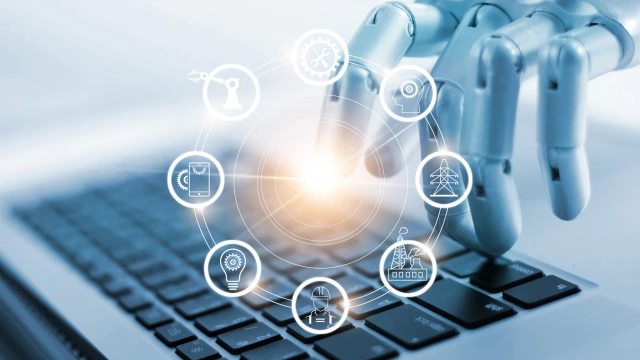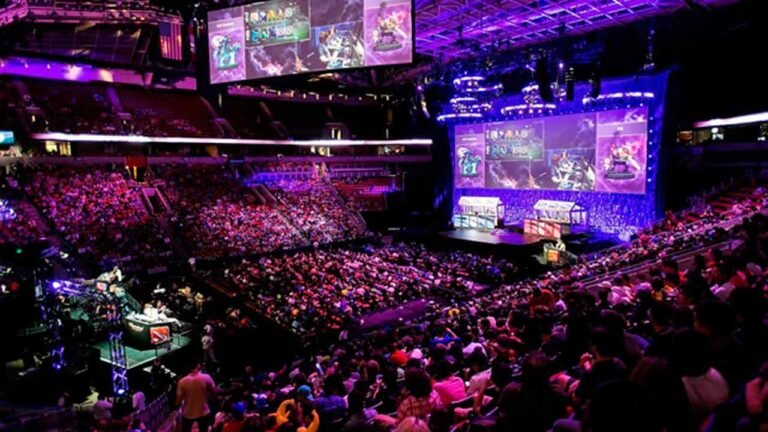
Introduction to Future Technology Trends
The significance of forecasting future technology trends cannot be overstated. As we advance further into the 21st century, technological innovations play a crucial role in shaping various aspects of society, the economy, and our daily lives. Understanding these trends provides insights into how emerging technologies will redefine the way we communicate, work, and interact with the world around us. With advancements in artificial intelligence, blockchain, and the Internet of Things (IoT), for instance, individuals and organizations are poised to experience profound changes in operations and lifestyle.
Expert opinions and forecasts serve as essential tools for navigating these technological shifts. They provide clarity on the likely trajectories of innovation and help stakeholders prepare for the challenges and opportunities that may arise. By analyzing current developments, industry experts can predict future outcomes with a degree of certainty, enabling businesses and policymakers to make informed decisions. In this rapidly evolving landscape, having access to reliable forecasts is invaluable for strategic planning and resource allocation.
Moreover, the implications of technology drift beyond economic concerns. They permeate social dynamics and ethical considerations as well. For example, advancements in biotechnology and machine learning often stir debates about privacy, employment, and the future of human interactions. Understanding the potential challenges posed by these technologies is as important as recognizing their benefits. Therefore, a balanced approach in forecasting future technology trends can guide society towards a more equitable and responsible integration of innovations.
In essence, recognizing the transformative power of technology ensures that individuals and organizations are equipped to adapt to an ever-changing environment. By exploring expert insights into future trends, we lay the groundwork for a comprehensive understanding of what lies ahead, preparing us for a future shaped by technological advancements.
Artificial Intelligence and Machine Learning
In recent years, artificial intelligence (AI) and machine learning (ML) have emerged as pivotal technologies reshaping various sectors. Experts forecast significant advancements in both fields over the next decade, with potential breakthroughs that may fundamentally alter how industries operate. AI systems are anticipated to evolve, enabling machines to perform tasks that were once thought to require human intelligence. As algorithms become more sophisticated, they will facilitate real-time data processing and improved decision-making across various applications.
One area where the impact of AI and machine learning is particularly promising is healthcare. Advanced predictive analytics can help identify diseases earlier and personalize treatment plans, enhancing patient outcomes. Machine learning models analyzing vast datasets will provide insights into patient care, potentially revolutionizing the way healthcare providers manage resources and deliver services. Moreover, the integration of AI could streamline administrative tasks, allowing professionals to focus more on patient care.
In the finance industry, AI and ML are poised to enhance security protocols, improve fraud detection, and automate trading processes. Financial institutions are increasingly adopting these technologies to analyze market trends, assess risks, and offer personalized financial services. The capacity of machine learning algorithms to adapt and learn from new data sets will lead to more robust investment strategies and better customer experience.
However, with such transformative potential comes ethical considerations. As AI systems become prevalent, issues related to data privacy, bias in algorithms, and accountability will require careful examination. The challenge will be to navigate these ethical dilemmas while harnessing the benefits of AI and machine learning technologies.
Overall, the future of artificial intelligence and machine learning promises to be dynamic, bringing about profound changes across various sectors. The convergence of these technologies will likely enhance efficiency, drive innovation, and spur economic growth, making this a critical area to watch in the coming years.
The Rise of Quantum Computing
Quantum computing stands at the forefront of technological innovation, promising to redefine our capabilities in computation and problem-solving. Experts anticipate that the advancements in this field will lead to a paradigm shift, enabling us to tackle complex problems that are currently beyond the reach of classical computers. This emerging technology relies on the principles of quantum mechanics, where quantum bits, or qubits, can exist in multiple states simultaneously. This characteristic allows quantum computers to perform calculations at unprecedented speeds.
One area where quantum computing is expected to make significant strides is in cybersecurity. Traditional encryption methods rely on complex mathematical problems, which could be easily solved by quantum algorithms such as Shor’s algorithm. This raises serious concerns about data security, as it may necessitate an overhaul of current encryption standards. As a response, researchers are investigating quantum-resistant algorithms to fortify encryption against potential threats posed by quantum attackers.
In addition to cybersecurity, the impact of quantum computing on data analysis is profound. Industries such as finance, healthcare, and logistics stand to benefit from enhanced data processing capabilities. Quantum algorithms can optimize problem-solving processes, streamlining operations and providing more accurate predictive analytics. For instance, in drug discovery, quantum computing has the potential to simulate molecular interactions at a level of detail that classical systems cannot match, thus accelerating the identification of new pharmaceuticals.
Overall, expert forecasts indicate that the rise of quantum computing will not only revolutionize industries by enhancing operational efficiency but also transform research methodologies, enabling scientists to make discoveries that were previously unimaginable. As we move forward, keeping pace with these advancements will be crucial for harnessing the full potential of quantum technologies.
The Internet of Things (IoT) and Smart Devices
The Internet of Things (IoT) has emerged as a transformative force within the realm of technology, forging a connection between physical objects and the digital landscape. As projections indicate significant growth in the number of interconnected devices, experts anticipate a future increasingly saturated with smart technologies. By 2025, it is estimated that there will be over 75 billion devices globally linked to the Internet. This expansion presents not only opportunities for enhanced convenience and efficiency but also challenges related to security, interoperability, and data privacy.
The proliferation of smart devices enables new applications across various sectors such as healthcare, agriculture, and urban planning. For instance, in healthcare, IoT can facilitate remote patient monitoring, improving outcomes through real-time data collection. In agriculture, smart devices optimize resource management, allowing for precision farming and sustainable practices. However, the integration of these technologies into daily life also raises pertinent concerns. Security vulnerabilities remain a critical issue, as the more devices connected to the Internet, the larger the potential attack surface for cybercriminals. Consequently, ensuring robust security measures is essential to safeguard sensitive data and enhance consumer trust in these innovations.
Furthermore, the rise of interconnected devices necessitates standards and protocols for seamless interoperability. As various manufacturers develop their own IoT technologies, a lack of uniformity could hinder the full realization of IoT’s potential. Hence, collaboration among stakeholders, including developers, policymakers, and the private sector, is vital for establishing standards that promote compatibility and facilitate innovation.
In conclusion, the future of IoT and smart devices promises substantial advancement, fostering efficiency and convenience. However, the challenges related to security and interoperability must be strategically addressed to harness the full capabilities of IoT in a way that benefits society at large.
Blockchain and Decentralized Technologies
As we progress further into the digital age, blockchain technology is poised to extend its influence far beyond the realm of cryptocurrencies. This distributed ledger technology, renowned for its security features, transparency, and decentralized nature, presents numerous opportunities for innovation across various sectors. Experts anticipate that one of the foremost areas of impact will be in supply chain management, where blockchain can enhance traceability and accountability at every stage of the product lifecycle.
By enabling all participants in the supply chain to access and validate transaction data, blockchain can significantly reduce fraud and discrepancies. For instance, retailers can verify the authenticity of products, while consumers can trace the origins of goods they purchase, ensuring that ethical and sustainable practices are adhered to. This shift toward transparency can lead to enhanced consumer trust and loyalty.
Moreover, the banking sector is on the brink of transformation driven by blockchain technology. Traditional banking processes, often characterized by inefficiencies and high transaction costs, could be radically improved through the adoption of decentralized finance (DeFi) solutions. These solutions allow for peer-to-peer transactions without the need for intermediaries, reducing processing times and enhancing accessibility for individuals unbanked by conventional financial institutions.
Emerging trends in decentralized applications (dApps) and smart contracts are also attracting significant attention. Smart contracts, which execute automatically when predetermined conditions are met, offer the potential for greater autonomy in transactions while minimizing human error. Industries ranging from real estate to healthcare are beginning to explore the advantages of these self-executing contracts, as they can streamline processes and bolster security.
In conclusion, as blockchain and decentralized technologies evolve, they are set to transform numerous sectors, paving the way for a more efficient, transparent, and trustworthy digital landscape. The influx of innovative applications will continue to challenge traditional paradigms, compelling organizations to adapt in order to remain competitive in this dynamic technological environment.
5G and Next-Generation Connectivity
The advent of 5G technology is poised to revolutionize connectivity, impacting a multitude of sectors such as entertainment, transportation, and remote work. With speeds that far exceed current 4G networks, experts predict that 5G will enable a seamless integration of various digital services, unleashing a plethora of new applications and enhancing user experiences. This advanced connectivity is set to empower industries by facilitating real-time data transmission and processing, thereby fostering innovation and efficiency.
In the realm of entertainment, 5G technology is expected to transform how content is consumed. Enhanced data speeds can support high-definition video streaming and virtual reality experiences without the buffering delays that plague current networks. This enhanced performance could lead to new business models for content providers, allowing for more immersive and interactive entertainment options that were previously unfeasible.
The transportation sector will also witness significant advancements due to next-generation connectivity. 5G is crucial for the development of smart transportation systems and autonomous vehicles. These vehicles depend on real-time communications to operate safely and effectively, processing data from various sources including traffic signals and other vehicles on the road. By enabling quicker response times and better decision-making, 5G could greatly improve road safety and decrease congestion.
Moreover, the shift towards remote work has accelerated due to the ongoing global events, and 5G will play a vital role in this transformation. With reliable and fast internet access, employees can effectively collaborate and communicate, irrespective of their physical location. This shift is expected to lead to greater productivity and flexibility in the workforce, making remote work not just a temporary solution but a long-term strategy for many organizations.
Overall, the implications of 5G technology are vast, and as experts continue to explore its potential, it is clear that enhanced connectivity will reshape various industries in unprecedented ways.
Virtual and Augmented Reality Advancements
As we look towards the future, advancements in virtual reality (VR) and augmented reality (AR) promise to revolutionize a variety of sectors, including education, training, and entertainment. Experts in the field forecast significant growth and diversification in VR and AR applications, predicting that these technologies will become increasingly integral to everyday experiences. With the adoption of high-resolution displays and improvements in headset ergonomics, users can anticipate more immersive environments that feel remarkably lifelike.
In the realm of education, VR creates opportunities for experiential learning by allowing students to engage with content in a three-dimensional context. For instance, history students can explore ancient civilizations through meticulously crafted simulations, while medical trainees can practice surgical procedures in a realistic, risk-free setting. The interactive nature of VR fosters deeper understanding and retention of information, positioning it as a valuable educational tool.
AR, on the other hand, supplements real-world environments with digital information, which can be transformative for various industries. For example, in the field of architecture, AR can enable architects and clients to visualize designs and make adjustments in real-time. Retail sectors are also harnessing AR technology to enhance customer engagement, allowing consumers to try products virtually before purchase—a shift that could redefine shopping experiences.
Entertainment will undoubtedly benefit from these advancements as well. With the rise of VR gaming and interactive storytelling, entertainment mediums are evolving into experiences that actively engage users rather than passively observing. Moreover, as technology continues to advance, the integration of social VR platforms will enable users to connect in virtual spaces, further enhancing personal engagement.
These developments in VR and AR represent a paradigm shift in how we interact with technology and the world around us. As experts continue to innovate, the future holds promise for enhanced user experiences across various sectors.
Biotechnology and Healthcare Innovations
As we look toward the future, the potential of biotechnology in transforming healthcare continues to expand. This evolution is characterized by significant advancements in personalized medicine, gene editing, and health monitoring systems. Personalized medicine, which tailors treatment to individual patients based on genetic, environmental, and lifestyle factors, is expected to enhance treatment efficacy and minimize adverse effects. By utilizing genetic information, healthcare providers can determine the most effective therapies for each patient, leading to improved health outcomes and higher patient satisfaction.
A prominent tool in this shift is gene editing, particularly technologies like CRISPR-Cas9, which allow for precise modifications to DNA. This innovative approach holds remarkable promise for treating genetic disorders, with the potential to eradicate hereditary diseases by directly correcting flawed genes. Experts predict that as gene editing becomes more refined and accessible, it will revolutionize not only treatment but also preventive medicine by enabling early intervention based on genetic predispositions. However, ethical considerations regarding genetic modifications remain a critical area of discussion, necessitating a balance between innovation and moral responsibility.
In tandem with these advancements, health monitoring systems are becoming more sophisticated. Wearable devices and mobile health applications are empowering patients to track their health metrics in real-time. This continuous data collection can enhance the management of chronic conditions, facilitate timely interventions, and promote proactive involvement in personal health. Such technologies are increasingly vital in addressing global health challenges, particularly in remote or underserved regions, where access to traditional healthcare is often limited.
As biotechnology evolves, the implications for patient care are profound. The integration of these emerging technologies into healthcare systems holds the key to tackling the complexities of modern health challenges, fostering a future where diseases can be treated more effectively and efficiently.
Ethical Considerations and Regulations in Tech
The rapid development of emerging technologies brings to the forefront significant ethical considerations that must be addressed to ensure responsible innovation. With advancements in artificial intelligence, machine learning, and data analytics, questions regarding privacy and security have become increasingly pertinent. As technology continues to permeate various aspects of daily life, it is imperative to scrutinize how data collection and utilization may infringe on individual privacy rights. Experts suggest that robust privacy frameworks are necessary to protect users from potential abuses stemming from these innovations.
Moreover, security concerns are critical in the context of technological advancements. Cybersecurity threats are evolving alongside the technologies they target, making it essential for organizations to adopt proactive measures against data breaches and cyberattacks. Regulations must evolve to ensure that companies prioritize cybersecurity practices, not only to protect their assets but also to safeguard the data of their customers. Establishing clear guidelines around data security can mitigate risks and foster public trust in these emerging technologies.
Furthermore, the societal impact of technology cannot be overlooked. Innovations such as automation and artificial intelligence raise important questions about their effect on employment and economic inequality. As these technologies displace traditional jobs, discussions around responsible technology deployment and retraining of workers become crucial. Ethical considerations should promote inclusivity, ensuring that advancements benefit a broader segment of society rather than a select few.
To navigate these complex challenges, experts advocate for comprehensive regulations and frameworks that will guide technological advancement. Such frameworks should encapsulate ethical guidelines, privacy protections, and security standards to create a balanced approach towards innovation. Ultimately, fostering a collaborative dialogue among technologists, ethicists, policymakers, and the public is vital to cultivate a future where technology serves humanity ethically and responsibly.




